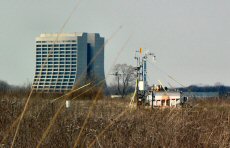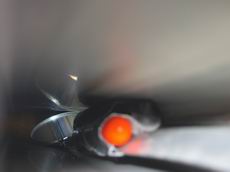|
Mon., March 19
2:30 p.m. Particle Astrophysics Seminar -
Curia II
Speaker: E. Siegel, University of Wisconsin
Title: Probing Dark Matter Substructure with Pulsars
3:30 p.m. DIRECTOR'S COFFEE BREAK - 2nd Flr X-Over
4:00 p.m. All Experimenters' Meeting - Curia II
Tue., March 20
1:00 p.m. Special Seminar - 1 West
Speaker: A. Dael, DAPNIA/Saclay
Title: Superconducting Technology for Accelerators at Saclay
3:00 p.m. Computing Techniques Seminar - FCC1
Speaker: J. Kupsch, University of Wisconsin
Title: Vulnerability Assessment of Grid Software
3:30 p.m. DIRECTOR'S COFFEE BREAK 2nd Flr X-Over
4:00 p.m. Accelerator Physics and Technology Seminar - 1 West
To Be Announced
Click here for NALCAL,
a weekly calendar with links to additional information. |
Monday, March 19
- Potato au gratin soup
- Monte cristo
- Savory roasted chicken quarters
- Lasagna bolognaise
- Chicken ranch wrapper
- Assorted slice pizza
- Szechuan style pork lo mein
Wilson Hall Cafe Menu |
|
Wednesday, March 21
Lunch
- Saucisson en Croute w/Madeira Sauce
- Salad of Field Greens w/Mustard Vinaigrette
- Amaretto Chocolate Cheesecake
Thursday, March 22
Dinner
- Vichyssoise
- Monkfish w/Cognac Sauce
- Herbed Rice Pilaf
- Steamed Asparagus
- Apple Galettes
Chez Leon Menu
Call x4598 to make your reservation. |
|
|
Carbon study on the prairie has global implications
This is the third article in a four-part series on lab ecology.

A data monitoring system collects ecological information for modeling global carbon cycles.
Researchers from Argonne National Laboratory often work at Fermilab, but some never set foot inside a building. Led by principal investigator Roser Matamala, a group of Argonne ecosystem specialists uses high-tech monitoring equipment to measure the carbon consumption of different plant types on Fermilab grounds. Since the release of carbon dioxide into the atmosphere contributes to global warming, these measurements offer clues on the role of plants in helping to offset human carbon emissions.
Fermilab is one of seven designated DOE National Environmental Research Parks, which provide protected natural areas for ecologists to study the forces of nature. The broad range of ecosystems available at Fermilab makes the place an ideal study site. Since July 2005, the Argonne researchers have measured water vapor, heat, and gas exchange within two sites: restored prairie and cultivated prairie. "The Fermilab restored prairie has given us two years of wonderful data so far," said Matamala.
In January, the group began monitoring a third site, this one within the dog training area. Powered by solar energy, the equipment monitors what ecologists call a monoculture: an ecosystem with only one type of plant. The switchgrass covering this pasture has recently become desirable for its use in ethanol fuel. The data gathered at Fermilab, however, may corroborate a growing opinion that high-diversity plant cultures are more environment-friendly because they can produce more biofuel and sequester more carbon than monocultures.
The information gathered by Matamala's team is incorporated within Ameriflux, an international network of researchers monitoring carbon flux at more than 100 different sites across the Americas. "The overlying purpose is to figure out which ecosystems do the best job of grabbing carbon from the atmosphere," said Fermilab ecologist Rod Walton. Ameriflux and other worldwide experiments provide the data to inform policy guidelines such as the recent Intergovernmental Panel on Climate Change report, issued February 2. "If we know how different these processes are -- from a desert in Utah to forests in Amazonia -- we can integrate the data over different ecosystems," said Matamala. "We can predict what the climate will look like in 70 or 100 years."
Read the previous Fermilab Today article about Matamala's research.
--Christine Buckley
|
|

What is it? This photo that ran in Friday's issue didn't stymie the engineers and technicians who regularly work with this instrument: Fermilab Today received many correct guesses. "This external proton beam magnet was going to be installed in the MTest beamline and was not leak-tight," wrote AD's Christine Ader, who submitted the photo. The round object in the photo is an inspection mirror, positioned to display a crack in the beam tube. "This particular magnet was an EPB Dipole," Ader explained, "and at some point, beam had scraped the inside of the beam-tube and led to the crack shown in the mirror."
|
From Innovations Report,
March 16, 2007:
UK teachers set to experience physics up close
A group of physics teachers from the UK will get to see cutting edge physics research in action when they visit CERN, the European Particle Physics Laboratory, in Geneva this week.
The UK delegation of 14 will take part in the Physics Teachers @CERN event (15th -18th March) which attracts teaching staff from across Europe. The event, which takes place during National Science and Engineering Week, provides the teachers with the opportunity to network and share ideas with their national and European counterparts. They will be given an insight to contemporary particle physics at CERN, visit some of the experimental facilities and find out more about how spinoffs from particle physics can impact on our every day lives.
Read More
|
|
|
ES & H perspectives:
Bridget Iverson

Bridget Iverson joined Fermilab's Technical Division as environmental coordinator last October, after extensive work in the world of consulting. Bridget, who has a B.S. degree in environmental health, first worked in Las Vegas on environmental characterization of the Nevada Test Site. She later returned to Chicago where she worked on an ES&H compliance e-mail reminder system.
Since arriving at Fermilab, Bridget has assumed the role of waste coordinator for Technical Division and is investigating the use of an existing database for internal environmental reviews. Bridget has a few reminders to help keep the wheels of ES&H turning smoothly at Fermilab.
Chemical waste: Waste coordinators assist other employees in characterizing, packaging, labeling, and temporarily storing the waste materials that they generate through their work. Filling out Chemical Waste Pickup Forms correctly and completely would make life easier for everyone.
Training forms: A recent internal audit showed that some organizations (not Technical Division) had failed to send hard copies of training records to a central location. All sign-up sheets for training completed after 12/31/2006 should be sent to the ES&H Section at MS119.
Communication: Communication is a major factor in ES&H. Practice active listening, provide honest direct feedback, and give serious consideration to input from others. Conversations should be two-way and should include the "bigger picture" to better explore ideas.
Safety Tip of the Week Archive
|
Weight Watchers classes
The Recreation Office will offer a free informational meeting for Weight Watchers classes on Wednesday, 3/21/2007 at 12:00 p.m. in the WH15SW conference room. This meeting was rescheduled from last Wednesday, March 14. If an 18-person minimum is met, the program will being Wednesday, March 21 and will run until Wednesday, June 13. Cost for the 12 weeks + 1 free week is $144 per person and is payable by cash, check, any of the 4 major credit cards, or a 3 part payment. The regular weigh-in time will be 12:00 pm and meeting time will be 12:30 pm.
Spring break child care program
Exciting Explorations! is a child care program for children ages 5 through 12. Depending on interest, the program would be offered March 26-30, 2007. Please send a sack lunch. Two snacks and beverages will be provided. The cost is $35.00 per day, and payment is due when you drop off your child. A 24-hour cancellation notice is required once your child is registered.
If you would like to use the program for any of these days, please call The Children's Center at x3762 and talk to Susan, Mary or Patti. You can also email daycare@fnal.gov. Requests must be made by noon, March 23.
Fermilab summer day camp
The deadline to register for the Fermilab summer day camp for children, ages 7 through 12 years of age, is March 29 at 5:00 p.m. Entrance into the camp will be made by lottery drawing on March 30. Camp sessions are: Session I-June 11 thru June 29, Session II-July 2 through July 20, Session III-July 23 - August 10. The fee for each three-week session is $285.00. A $125.00 per child/per session deposit is required at the time of registration. More information regarding the camp and registration forms can be found in the Recreation Office, Housing Office, Users Office and at the Recreation Office web site, or by calling the Recreation Office at x5427 or x2548.
Professional development
Upcoming classes:
- Cascading Style Sheets: Introduction, April 10 & 12, 2007;
- Adobe Acrobat 7.0 Professional: Advanced, April 17, 2007 (note date change from April 3 to April 17);
- Interpersonal Communication Skills for Scientific Staff, Computer Professionals, Engineers and Technicians: May 9, 2007.
More information and registration
Upcoming Activities |
|